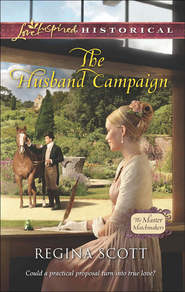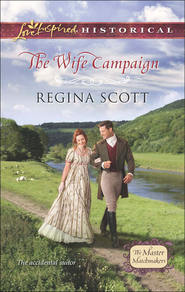По всем вопросам обращайтесь на: info@litportal.ru
(©) 2003-2024.
✖
The Courting Campaign
Настройки чтения
Размер шрифта
Высота строк
Поля
Nick kept his own fork in his hand with a distinct feeling of self-protection. “I am not opposed to dining with Miss Pyrmont. She makes intelligent, some might even say witty, conversation. She is pleasant to look upon. However, my thought was that Alice would need someone to attend her.”
Charlotte’s chin seemed to have shortened. Tightening of the muscles, perhaps? “Then you find me incompetent to assist your daughter in social settings,” she said.
He never had understood why his words were so easily misconstrued. He thought he had a rather good grasp of the English language. Certainly his tutors had never complained. But when it came to Charlotte and even Ann, what he meant never seemed to be what they heard.
“My opinion of your competence should be evident by the fact that I leave all matters in this household to your attention,” he told Charlotte. “As I already trespass on your generous nature by having you manage the staff, I thought perhaps you’d prefer to eat your dinner in peace and allow someone who is paid to see to Alice’s needs assist her through dinner until she is experienced enough to do so herself.”
He must have succeeded in communicating at last, for she dropped her gaze. “I see. Forgive me, Nicholas. I know I am not here because of my generous nature but yours. If you wish Miss Pyrmont to join us for dinner in the future, I will make the arrangements. It may take a day or two to work out the menus with Mrs. Jennings.”
Nick wasn’t sure why menus would be so complicated, but he thanked his sister-in-law for the effort. A glance at the trout and the new potatoes beside it confirmed he had no interest in either. Conversation held as little appeal. He rose, and Charlotte glanced up, eyes widening.
As she appeared to require him to state the obvious, he did. “I’m finished with dinner this evening. If you will excuse me, I have work to do.”
Charlotte nodded, but he hadn’t really expected otherwise. Theirs had never been a congenial relationship, and Ann’s death had only made matters worse. At least in his work he had some hope of untangling difficulties, unlike Charlotte’s unpredictable responses.
Yet his work continued to thwart him that night. He sat in his study, reviewing his calculations, considering alternative theories that had been proposed by his peers the last few months. Why couldn’t he find the solution? Certainly there had to be at least one, and he had considered the possibility that there was more. Was he truly as deficient as his colleagues in the Royal Society had intimated when they’d cast him from their number?
He pushed such thoughts aside. He had evidence that he had some pretentions toward knowledge—scores at Eton and Oxford, his work on the properties of common materials for industrial use that had earned him his knighthood. Until Ann’s death, there had been no hint that his faculties could fail him. He wanted to think of that as the aberration rather than the rule.
He worked for much of the night, as was his wont, then woke early and took a turn about the darkened grounds to clear his head. He had noticed that movement seemed to stimulate thought, but in this instance no revelation presented itself.
By the time he returned for breakfast, he was in no mood for further arguments. Perhaps that was why he took one look at the breakfast tray the footman brought him—the lumpy gray porridge; the cold charred toast—threw down his napkin and marched to the kitchen.
“Mrs. Jennings,” he began as soon as he stepped over the threshold. He had the momentary satisfaction of watching all movement in the room jerk to a stop. Miss Pyrmont, who had been preparing a tray on the worktable in the center of the room, stared at him, mouth pursed as if she offered a kiss.
Why did he persist in thinking about kisses? He shook his head to cast out the image and glanced around at the others. Mrs. Jennings stood by the fire, ladle raised above a pot and dripping so that the liquid sizzled on the hearth. The young maid by the sink dropped the cup she’d been holding with the unmistakable crack of breaking china.
That woke his cook. She thrust the ladle back into the pot, hurried forward and bobbed a curtsey. “Sir Nicholas, what’s happened to bring you to my kitchen again?”
So she remembered the days he’d sought solace at her worktable. The kitchen had always been the warmest room in this house, not only in temperature but in the welcome he’d felt. That seemed to have changed. The maid was trembling as she picked up the chards from the basin. Miss Pyrmont seemed to be trembling as well, but the light in her eyes and the way she had compressed her lips suggested she was holding back laughter.
“Sir Nicholas?” Mrs. Jennings asked, head cocked.
Nick straightened. “I thought I should ask after your health.”
His cook’s snowy brows shot up. “My health? Whatever for?”
They were all staring at him as if the very idea was preposterous. Only Miss Pyrmont looked remotely sympathetic. She offered him a smile as she gripped the tray she’d prepared. He considered offering his help to lift it from the table. Indeed something positively urged him to rush forward and take it from her. What nonsense was that? She seemed confident and capable of carrying the thing, and it was clearly her duty.
So he turned his attention to Mrs. Jennings and his reason for visiting the kitchen again after all these years.
“Dinner last night and breakfast this morning did not seem up to your usual standards,” he told the cook. “I was wondering what might have changed. If you are well, have you perhaps taken on an assistant?”
He glanced at the maid, who promptly dropped all the pieces of the cup into the sink again. Perhaps Charlotte had had reason to stare so fixedly at him last night. It seemed somewhere along the way he’d become ferocious.
“No assistant,” Mrs. Jennings assured him. “A shame your dinner and breakfast were not to your liking.”
She didn’t look the least bit abashed. People who were embarrassed by lapses in good judgment or behavior generally hung their heads, shuffled their feet, made excuses. Mrs. Jennings was regarding him with a smile he had always considered kind.
“Then can you assure me that future meals will return to their usual quality?” he asked.
Miss Pyrmont was definitely biting her lower lip now. He could tell even though she’d bowed her head and clamped her arms to her sides.
“Oh, I cannot say, sir,” Mrs. Jennings replied. “I best speak to Mrs. Dunworthy about the matter. I’ve been so busy lately I don’t have time for the little extra things.”
He felt the same way. “Quite understandable,” he assured her. “For now, might I trouble you for some of those cinnamon biscuits you generally put on my breakfast tray?”
Mrs. Jennings set her finger against her lips. “Goodness me! I remember how you used to dote on those. But I’m afraid I sent the entire batch upstairs for Miss Alice. If you’d like some this morning, you’ll have to have breakfast with her.”
Chapter Six
Oh, the clever woman! Emma hid her smile at Mrs. Jennings’s decree and Sir Nicholas’s obvious surprise. The cook had given Emma an opportunity. Emma intended to take it.
“Yes, Sir Nicholas,” she said, hefting the tray. “I was just about to bring Alice her breakfast. Won’t you join us?”
His look crossed from her to Mrs. Jennings and back again as if he simply could not believe them. Emma let her smile shine and hoped it looked more welcoming than triumphant.
“It won’t take long,” Mrs. Jennings encouraged him. “Miss Pyrmont is generally back downstairs in about a quarter hour. Your tray often takes longer than that to return.”
Still he hesitated. A quarter hour? He was wrestling over sparing so little time for his daughter? She had her work cut out for her, it seemed. But at least breakfast was a start.
Please, Lord, help him agree!
“Very well,” he said, and Emma sent up a prayer of thanks. “I had something I wished to say to Alice in any regard.”
He strode to Emma’s side and held out his hands. “Allow me, Miss Pyrmont.”
She felt his fingers brush hers and nearly dropped the tray at the unexpected warmth. She barely managed to transfer the platter to his control. Then it was his turn to look surprised.
“Something wrong, Sir Nicholas?” she asked.
He eyed her up and down, and she felt her color rising. “The weight to height ratio is off,” he said.
Emma drew herself up. “I beg your pardon?”
He frowned. “The tray is heavier than I expected for a woman of your slender frame.” He glanced at the cook. “I seem to remember we had a footman in the nursery when I was young.”
Mrs. Jennings’s round face did not show the annoyance Emma was certain she was feeling that she could no longer address the problem herself. “We’ve had trouble keeping our fellows on the staff for some time, sir.”
Though she didn’t say it, Emma suspected the issue lay in Mrs. Dunworthy. They had men who worked outdoors—grooms, gardeners, the head coachman Mr. Dobbins—but only a single footman indoors, and Charles often looked a bit harried to be at Mrs. Dunworthy’s beck and call. A household this size generally boasted a butler, kitchen help and more maids. Even Dorcus, who served as Mrs. Dunworthy’s maid, had to do double duty, helping with cleaning and serving. But perhaps Mrs. Dunworthy had decided that having fewer staff was wiser so far from London.
Вы ознакомились с фрагментом книги.
Приобретайте полный текст книги у нашего партнера:
Приобретайте полный текст книги у нашего партнера:











